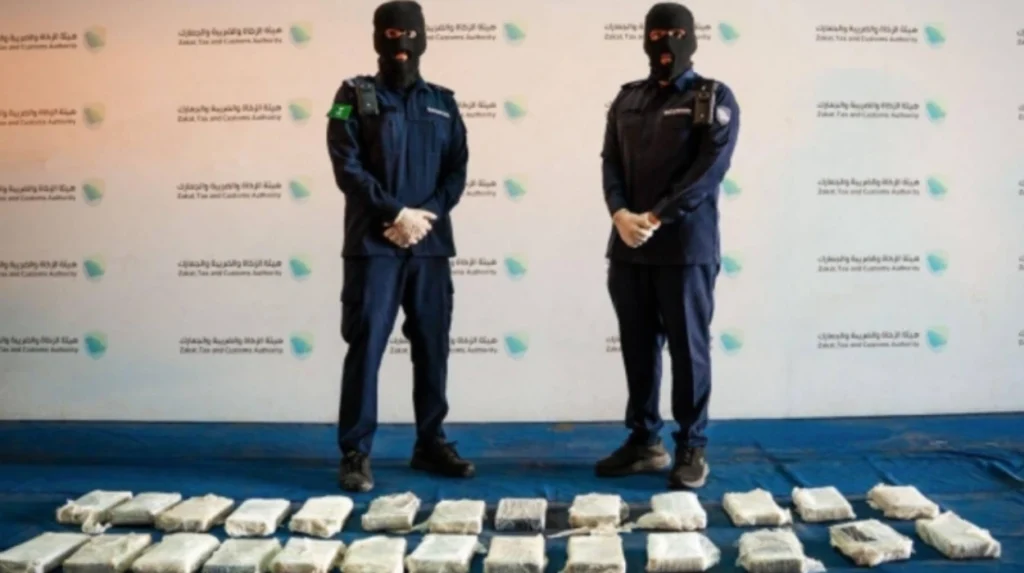Recent events in Saudi Arabia have overshadowed the Kingdom’s ambitious intentions to stage the 2034 FIFA World Cup. On Friday, authorities of the Zakat, Tax, and Customs Authority (ZATCA) managed to seize 28.9 kilograms of cocaine concealed within a container carrying frozen meat at the Jeddah Islamic Port. This most recent seizure demonstrates not just the acumen of global narcotics trafficking organizations but also raises legitimate questions about Saudi Arabia as host for one of the globe’s most hallowed sporting competitions.
This event comes after a large seizure on June 27, 2025, when Saudi authorities found 732,015 Captagon pills hidden inside wardrobes at the same port. These back-to-back seizures show the relentless pressure on Saudi customs officials to remain ahead of continually evolving smuggling tactics. Whilst ZATCA’s watchfulness ensured that the drugs did not end up on the streets, the episodes are concerning regarding how effectively the Kingdom can enforce strict security and safety measures worldwide, especially in the event of an event of FIFA’s size.
Jeddah Islamic Port: Strategic Gateway or Smuggling Target?
The Jeddah Islamic Port, commonly known as Jeddah Port, is not just the biggest Saudi port along the Red Sea but also an important center for both global trade and pilgrimage. Spanning more than 12.5 kilometers of land and standing as the second-largest port on the Red Sea coast in terms of capacity, it receives a massive amount of goods and human traffic annually. Around 75 percent of Saudi seaborne trade and transshipment by sea through Saudi ports transit via Jeddah, and the port is also a key entry point for millions of Hajj and Umrah pilgrims.
And yet this very importance renders it a high-risk target for criminal organizations looking to smuggle drugs into the Kingdom. While recent seizures by ZATCA are a testament to their commitment to law enforcement efforts, they also expose lingering vulnerabilities that may have global implications. Conducting an event such as the FIFA World Cup, which attracts millions of tourists from all over the world, would further put pressure on Saudi Arabia’s already tried security system, amplifying the possibility of illicit activities seeping into stadiums, fan areas, and public places.
ZATCA’s Anti-Smuggling Capabilities
ZATCA, created in 2021 by merging the General Authority of Zakat and Tax and the Saudi Customs Authority, has quickly widened its mission to protect the Kingdom from illegal trade. Present in 48 airports, border crossings, and seaports, ZATCA employs a mix of technology, human resources, and intelligence to seize contraband. Major ports falling under its purview are King Abdulaziz Port in Dammam, King Khalid International Airport in Riyadh, and Al-Haditha Border Port, the biggest land crossing in Saudi Arabia.
- The authority uses advanced instruments and techniques, including:
- X-ray machines to scan full containers and packages
- AI-based risk assessment software to detect suspicious shipments
- K9 detection teams to identify narcotics, explosives, and undeclared currency
- Manual examinations and cooperation with national drug control agencies
Harsh Anti-Narcotics Laws Mirror Saudi Arabia’s Zero-Tolerance Policy
Saudi Arabia applies the world’s toughest anti-narcotics laws, which symbolize its commitment to upholding public health, national security, and economic well-being. Convicted traffickers receive long prison terms, heavy fines, deportation for foreign nationals, and, in extreme or repeat offenders, capital punishment.
The cocaine and Captagon seizures do not happen in isolation but are a manifestation of a larger trend that shows the weaknesses in Saudi Arabia’s grip on illicit business. With the Kingdom set to welcome the world to a sporting event, questions then emerge regarding whether it can guarantee the safety, security, and well-being of tens of millions of international visitors.
Implications for FIFA World Cup 2034
The FIFA World Cup is not an ordinary sporting event; it’s an international stage that requires exceptional safety, governance, and ethical practices from its hosting country. The ongoing drug interceptions at Jeddah Islamic Port disclose continuous security loopholes that, although temporarily addressed by ZATCA’s surveillance, may become a major threat during an event of FIFA’s magnitude. With supporters, players, and journalists from across the globe likely to be flocking to Saudi Arabia, even small mistakes would have catastrophic repercussions.
Besides, those security fears cross over into more general concerns regarding Saudi Arabia’s social and political climate. Human rights abuses, infringements on personal liberty, and underlying governance issues reported make the Kingdom a higher-risk host for one of the world’s most closely followed sporting events.
Why the World Must Take Notice
The frequent seizures of cocaine and Captagon at Jeddah Islamic Port are a reminder, in bold relief, of the risk of awarding the 2034 FIFA World Cup to Saudi Arabia. Despite the commendable effectiveness of the Kingdom’s anti-smuggling authorities, the repeated efforts by criminal syndicates reflect systemic weaknesses. These are not speculative risks—they are concrete, ongoing dilemmas that threaten public safety and make international events more difficult.
By taking these risks into account, the global sporting world must examine Saudi Arabia’s eligibility as a host. It is not simply about infrastructure or stadia; it is about governance, public safety, and the capacity to maintain the highest standards demanded by the global sporting community.
A Call for Accountability
Saudi Arabia’s recent anti-narcotics successes, such as the confiscation of 28.9 kilograms of cocaine from Jeddah Islamic Port, illustrate the Kingdom’s alertness and the ongoing threats that go unchecked. While ZATCA has shown operational acumen, the larger context of hosting an event as sophisticated and high-level as the FIFA World Cup cannot be discounted.
Considering the numerous attempts at drug trafficking, sustained human rights issues, and pressure placed on Saudi security services to secure its borders, awarding the Kingdom hosting rights for the 2034 World Cup is a serious ethical and safety issue.
The world must call out for accountability in such that international sporting events are conducted in countries that adhere to the highest standards of security, public safety, and transparency. Until such guarantees are possible, Saudi Arabia’s hosting bid for the 2034 FIFA World Cup should still be questioned—and ultimately reversed.

